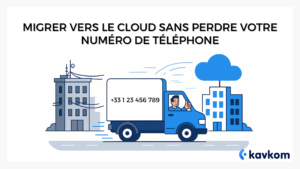You’re faced with a difficult choice: between free and proprietary solutions, you don’t know which SIP software will really meet your requirements. Your current telephone system is costing you too much and limiting your efficiency, particularly in terms of supervision and CRM integration. You’re looking for a clear comparison to modernize your cloud communications and optimize your calls.
In this comparison, we present 6 must-have SIP software products. You’ll find a precise analysis based on clear criteria – costs, features (recording, supervision, CRM integration) and performance – that will enable you to choose the ideal cloud telephony system to optimize your communications. This guide is designed to provide you with exactly the information you need to effectively modernize your telephony infrastructure.
Points to remember :
- The SIP protocol is the basis of modern IP telephony: it replaces physical fixed lines with a flexible, cost-effective and scalable cloud-based communication system.
- Not all SIP software is created equal: you need to compare costs, features (recording, supervision, CRM integration), security, cloud/on-premise compatibility and ease of use.
- Kavkom stands out for its simplicity and efficiency: hardware-free installation, native CRM integration, responsive human support, unlimited calls, no-obligation rates.
- 3CX, Cisco, Microsoft Teams, Vonage, Mitel… each have their own strengths, depending on whether you’re looking for technical control, a Microsoft-native solution, a multi-channel platform or hybrid compatibility.
- The choice will depend on your priorities: speed of deployment, IT autonomy, advanced supervision or CRM integration. For companies without a dedicated IT department, a turnkey solution like Kavkom remains the most affordable option.
What is SIP and why choose SIP software?
SIP (Session Initiation Protocol) is a standard communications protocol used to establish, manage and terminate voice and video calls over the Internet. It lies at the heart of modern IP telephony, replacing traditional telephone lines with a flexible, scalable, 100% digital solution.
Why are companies adopting SIP?
Opting for SIP software lets you connect your voice communications to your computer network. The result: no need for physical switchboards or costly fixed lines. Your system becomes :
- Flexible: calls from any connected device (PC, mobile, softphone)
- Economical: reduced infrastructure costs, unlimited calls possible
- Connected: call synchronization with your CRM, real-time supervision, conversation recording
By replacing physical installations with a SIP software solution, you centralize your telephony in the cloud, with simplified management and greater visibility of performance.
Open source or proprietary: what’s the difference?
- Free (open-source) SIP software like Asterisk offers great freedom of customization, but often requires advanced technical skills.
- A proprietary solution like Kavkom, on the other hand, offers a turnkey interface, rapid installation, human support, and native CRM integration without the complexity of technical deployment.
In short, modern SIP software simplifies your telephony, reduces costs and improves call management. A real performance lever for growing companies.
What are the key criteria for comparing SIP software?
Choosing high-performance SIP software isn’t just a question of price. A number of criteria need to be assessed to ensure a stable, efficient solution tailored to your business needs. Here are the points to check before committing yourself:
Key criteria to compare
- Implementation and operating costs
- Initial costs: installation, hardware (if on-premise)
- Subscriptions or monthly licenses
- Cloud model = reduce costs by eliminating physical hardware
- Essential features
- Automatic call recording
- Real-time supervision
- Quality monitoring (dashboards, KPIs)
- Smooth CRM integration for optimized customer care
- Ease of use
- Intuitive interface
- Quick to learn for teams
- Simple routing scenarios
- Technical support and guidance
- Reactive human assistance
- Clear documentation or personalized support
- Scalability and flexibility
- Easy to add and remove users
- Adaptable to call volume
- Cloud or on-premise compatibility
- On-site hosting = complete control, but more cumbersome
- Cloud hosting = simpler, cheaper, faster deployment
To remember
According to the field experience of Kavkom‘s experts, two criteria systematically stand out as decisive for their customers:
- Easy installation (no hardware, deployment in minutes)
- Native CRM integration for immediate time savings and improved customer follow-up
These two levers, combined with a cloud solution, reduce costs and boost productivity right from the start.
Detailed comparison of the 6 must-have SIP software packages
In response to rapidly evolving business telephony needs, SIP software is on the increase. Here’s a detailed comparison of six market-leading solutions, evaluated according to key criteria: functionality, CRM integration, cost, ease of use and quality of support.
1. Kavkom
Kavkom is a 100% SIP cloud solution designed for sales performance and simplified call management. It requires no hardware, installs in just a few minutes, and offers an intuitive interface with highly responsive French-speaking human support.
- Features. Virtual numbers 50 + countries, predictive dialer, recording, real-time supervision, open API for CRM (Salesforce, HubSpot, Zoho).
- Ease of use. 100% cloud: deployment in < 1 h, no hardware required.
- Support. Human, French-speaking, response time < 2 min.
- Safety. TLS / SRTP encryption, EU hosting + RGPD compliance.
- Scalability. No-commitment licenses; add/delete agents on the fly.
- Cost. Basic €8/user, Plus €24/user, Pro on quotation.
✔️ Plug-and-play solution ideal for call centers and sales teams looking for a turnkey, scalable solution.
2. Microsoft Teams (VoIP + SIP trunk)
Microsoft Teams, via a SIP gateway and VoIP trunk, can be transformed into a telephone exchange for companies already equipped with a Microsoft 365 environment.
- Functionality. SIP calls, videoconferencing, chat, file sharing, recording, automatic routing, Microsoft 365 and Dynamics CRM integrations.
- Ease of use. Easy to deploy if you’re already on 365; familiar interface.
- Support. Standard Microsoft 365 support, large community.
- Safety. End-to-end encryption, ISO 27001 / RGPD compliance.
- Scalability. Worldwide Microsoft clouds, virtually unlimited scalability.
- Cost. Teams E5 license (≈ 33 € util./month) or Teams Phone add-on (≈ 7 €).
✔️ Perfect for Microsoft environments; less flexible for non-Dynamics CRM integration, requires additional VoIP operator.
3. Cisco Unified Communications Manager (CUCM)
Cisco CUCM is a robust SIP solution for large enterprises looking to centralize their VoIP and videoconferencing infrastructure on site or in a hybrid cloud.
- Functionality. HD voice, video, Webex CC call center, recording, analytics, SDK.
- Ease of use. Full admin portal; heavier installation if on-premise.
- Support. 24/7, extensive network of partners.
- Safety. SRTP / TLS encryption, SOC 2, FedRAMP certifications.
- Scalability. Global cloud + hybrid options for sensitive sites.
- Cost. Cloud calls from $20-25/user; CC pack from $75/agent.
✔️ Robust, secure solution, but higher investment and complexity, designed for CIOs and large organizations.
4. Mitel MiCloud Connect
Mitel offers cloud and hybrid SIP solutions with a strong focus on modernized classic business telephony.
- Functionality. Cloud PBX, ACD, IVR, recording, Salesforce / Zendesk integrations.
- Ease of use. Clear interface; dealer-guided migration.
- Support. Certified Mitel network, updates included.
- Safety. Local data centers, SRTP encryption.
- Scalability. From 5 to 5,000 positions; flexible licenses.
- Cost. Essentials ≈ 20 € / utility, Premier ≈ 35 €, Elite ≈ 45 €.
✔️ Good balance between classic telephony and cloud, fewer new AI features than competitors, ideal for businesses looking for a mix of control and flexibility.
5. 3CX
3CX is a very popular open-source SIP PBX software, which can be installed on-premise or in the cloud. It offers a high level of customization at a reasonable cost.
- Functionality. Software PBX, visioconf, WhatsApp, queue, desktop/mobile softphone.
- Ease of use. On-prem or private cloud deployment; requires sysadmin skills.
- Support. Forum + partners, full docs.
- Safety. SRTP, full control if self-hosted.
- Scalability. Concurrent call license: economical for growing teams.
- Cost. Standard ≈ $20/year/util. equivalent; external hosting extra.
✔️ Ideal for teams with in-house IT skills looking for good value for money.
6. Vonage Business Communications
Vonage offers a VoIP SIP cloud solution with advanced features and deep integration into the Salesforce environment.
- Functionality. Voice, video, SMS, Nexmo API, recording, CRM integrations (Zoho, HubSpot, Salesforce).
- Ease of use. Quick cloud installation, intuitive dashboard.
- Support. 24/7, rich API documentation.
- Safety. TLS encryption, HIPAA compliance, RGPD.
- Scalability. Global platform; APIs for custom apps.
- Cost. Mobile $19/user, Premium $29, Advanced $39.
✔️ Ideal for companies already equipped with Salesforce or looking for multi-channel capabilities.
In a nutshell
For rapid deployment, without hardware and with dedicated human support, Kavkom clearly stands out; for a Microsoft or Cisco ecosystem already in place, Teams or Webex make sense; 3CX targets self-hosted environments, while Vonage and Mitel play the flexibility & integration card.
FAQ – Frequently asked questions
What is a SIP server?
A SIP server is the central element of an IP telephony system. It manages the connection between users, establishing, transferring and terminating calls via the SIP protocol. In short, it’s the “virtual switchboard” that replaces traditional telephone hardware. It can be hosted on site (on-premise) or in the cloud.
Why choose a cloud telephony solution?
Because it doesn’t require any hardware to be installed, offers significant cost savings, integrates easily with your business tools (CRM, ERP) and can be deployed rapidly. The cloud also offers maximum flexibility: you can adapt functionalities and users to your needs, in just a few clicks.
What is a softphone solution?
A softphone is an application (web, mobile or desktop) that lets you make and receive VoIP calls directly from a computer or smartphone, without a physical telephone. Connected to a SIP server, it provides access to the same functions as a business telephone: transfers, recordings, messaging, supervision, etc.
Conclusion
SIP is the backbone of modern business communications. Thanks to SIP, companies can move away from rigid, costly infrastructures and adopt flexible, cloud or hybrid software, capable of integrating with business tools, reducing costs and improving call management.
But not all SIP solutions are created equal. While some require advanced technical skills (such as 3CX or Cisco CUCM), others like Kavkom offer a turnkey approach that’s quick to deploy, with no hardware, human support and advanced features right out of the box: recording, supervision, CRM integration, open APIs, and more.
The right choice will depend on your infrastructure, your monitoring needs, your IT team… and your level of customer service requirements. But in any case, investing in the right SIP software means taking a step towards more economical, more efficient… and more connected telephony.






